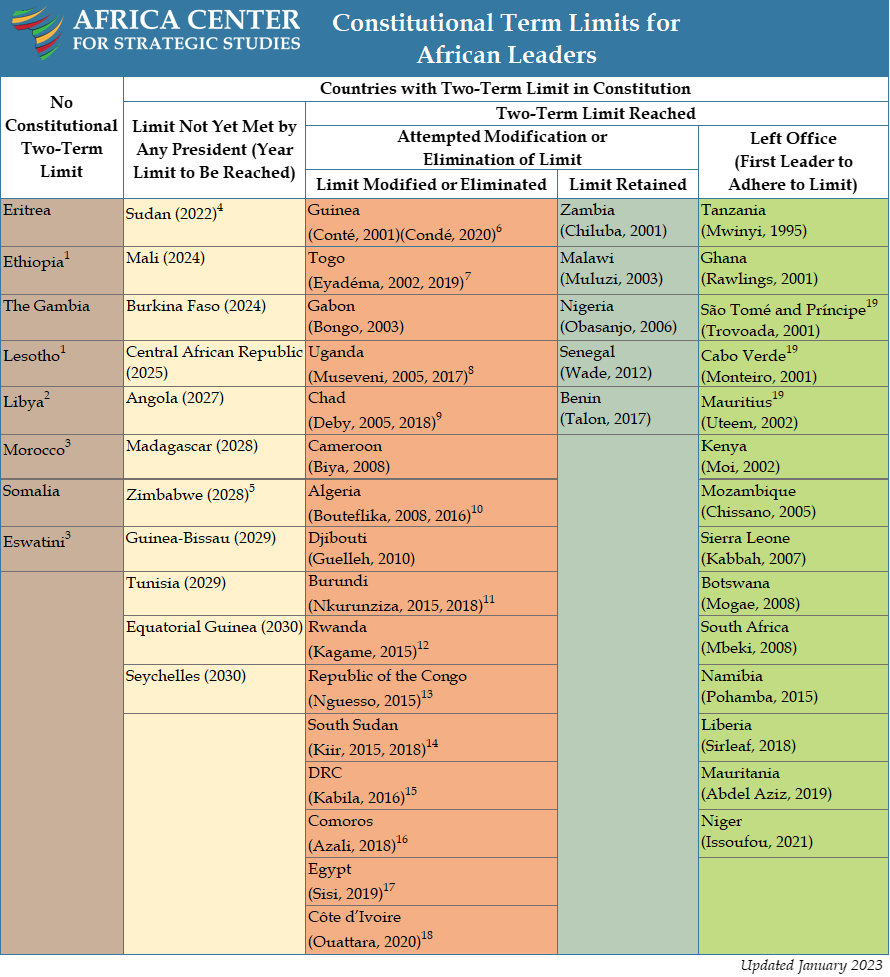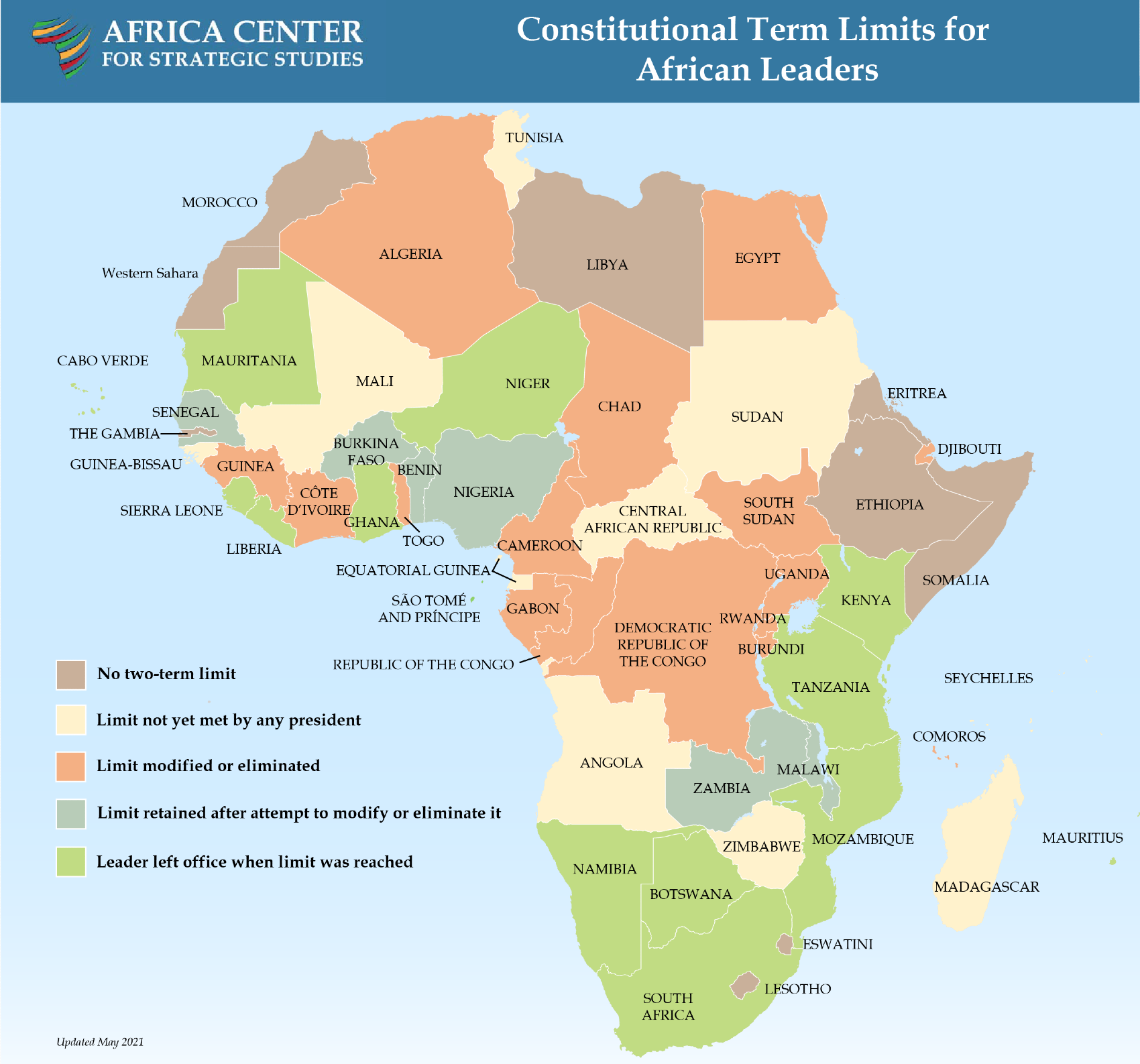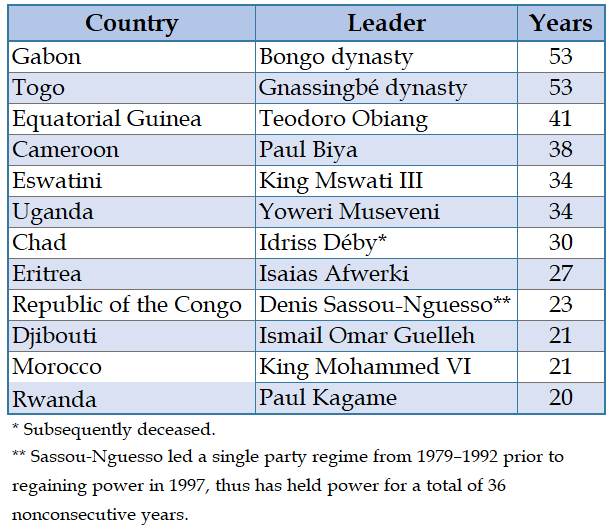
(Click here for printable PDF)
 (Click here for printable PDF)
(Click here for printable PDF)
Highlights
- Africa has seen a reversal in term limit norms since 2015. Since that time, leaders of 13 countries have evaded or overseen the further weakening of term limit restrictions that had been in place:
- Algeria
- Burundi
- Chad
- Comoros
- Côte d’Ivoire
- Democratic Republic of the Congo
- Egypt
- Guinea
- Republic of the Congo
- Rwanda
- South Sudan
- Togo
- Uganda
- Despite these setbacks, the trend is not uni-directional. Several African countries have strengthened or upheld term limits since 2015. These include Benin, Liberia, Mauritania, Senegal, and the Seychelles. They are part of a group of 21 African countries that continue to uphold term limits. Moreover, Central African Republic and Burkina Faso have held or will hold constitutional referendums to institute term limits.
- There is a notable regional variation in the upholding of term limits. Countries in southern and western Africa have demonstrated the greatest adherence to these norms, while swathes of northern, central, and the Horn of Africa have failed to do so.
- The lack of effective term limits has resulted in Africa having 10 leaders who have ruled for over 20 years and two family dynasties that have been in power for more than 50 years:

- This erosion of term limits is a setback for good governance in Africa:
- Leaders in countries with term limits have been in office, on average, for 3 years. Those that have modified or eliminated term limits have been in power for a median of 12 years.
- Recent years have also seen the ouster of long-ruling African leaders by their erstwhile political allies, resulting in a continuation of the existing power structure. If these regimes—Algeria, Burundi, Democratic Republic of the Congo, Sudan, and Zimbabwe—are included, then the median time in office for countries without term limits jumps to 19 years.
- All eight of the African countries facing civil conflict (excluding insurgencies by militant Islamist groups) are those without term limits.
- Of the 10 African countries that are the largest source of Africa’s 32 million refugees and internally displaced populations, 7 are countries lacking term limits.
- Corruption is a challenge in many African countries, though it is particularly pernicious in countries without term limits. For countries that have modified or eliminated term limits, the median ranking on Transparency International’s annual Corruption Perceptions Index is 134 out of 180 countries. This is 46 places lower than the average ranking for African countries that have adhered to term limits.
- Africa has 34 presidential elections scheduled between 2019 and 2021. In roughly one-third of these elections the issue of leaders challenging term limits has been central. The often controversial means by which these leaders are extending their terms undermines the legitimacy that these electoral processes are intended to generate.
- The institutionalization of term limits in Africa is part of a reform effort started in the 1990s to address the legacy of overconcentrated power in the executive. Term limits are seen as an especially important element of checks and balances in Africa given the relative weakness of independent democratic institutions such as the legislature, judiciary, civil service, security forces, media, public protector, and central bank.
Joseph Siegle is Research Director and Candace Cook is Research Assistant at the Africa Center for Strategic Studies.
Notes
- Ethiopia and Lesotho: Executive authority largely rests with the office of the prime minister, which does not face restrictions on tenure.
- Libya: A two-term limit has been included in the draft constitution.
- Morocco and Eswatini: Executive authority rests with a monarch.
- Sudan: The civilian-military transitional government’s mandate expires in January 2024. Civilian leadership of the Sovereign Council is set to begin in February 2022.
- Zimbabwe: The military ouster of Robert Mugabe in 2017 has allowed for the continuation of nearly four decades of ZANU-PF–led government.
- Guinea: A new constitution passed in a controversial 2020 referendum allowed Condé to run for a third term in 2020 and theoretically a fourth term in 2026.
- Togo: A two-term limit was reinstated in 2019, allowing Faure Gnassingbé to run for a fourth term in 2020 and theoretically a fifth term in 2025.
- Uganda: Presidential term limits were lifted in 2005, and the age limit was removed in 2017.
- Chad: A new constitution reinstated a two-term limit and changed terms from 5 to 6 years in 2018, allowing Idriss Déby to run for a sixth term in 2021.
- Algeria: A limit of two 5-year terms was reinstated in 2016, theoretically allowing Abdelaziz Bouteflika to run for a fifth term in 2019 (though he was subsequently forced to resign).
- Burundi: Following a controversial third term ruling in 2015, a new constitution extended presidential terms from 5 to 7 years in 2018.
- Rwanda: A controversial 2015 referendum allowed Paul Kagame a third 7-year term after which he may run for two 5-year terms, potentially remaining in power to 2034.
- Republic of the Congo: A new constitution in 2015 removed the age limit, reduced term length from 7 years to 5, and extended term limit to three terms.
- South Sudan: Salva Kiir’s term as elected president ended in 2015, but constitutional amendments in 2018 and a new unity government formed in 2020 extends his mandate until 2023.
- DRC: Joseph Kabila’s term as elected president ended in 2016, though he remained in office until the disputed elections in 2018, by which he retains considerable power.
- Comoros: A new constitution, approved in a controversial 2018 referendum allows the president to run for two consecutive 5-year terms, abolishing the one-term rotational system of power sharing among the islands.
- Egypt: A controversial constitutional amendment in 2019 extended Sisi’s second 4-year term by 2 years, and allows him to run for an additional 6-year (third) term that would end in 2030.
- Côte d‘Ivoire: The adoption of a new constitution in 2016 enabled Alassane Ouattara to run for a third term in 2020 and theoretically a fourth term in 2025.
- São Tomé and Príncipe, Cabo Verde, and Mauritius: The elected president is term limited, though power is shared with a prime minister, who is not.
More on: Democratization Governance Rule of Law

